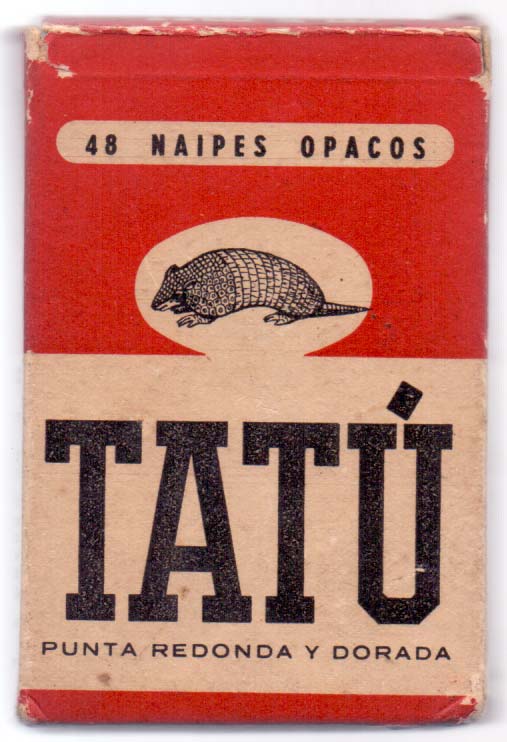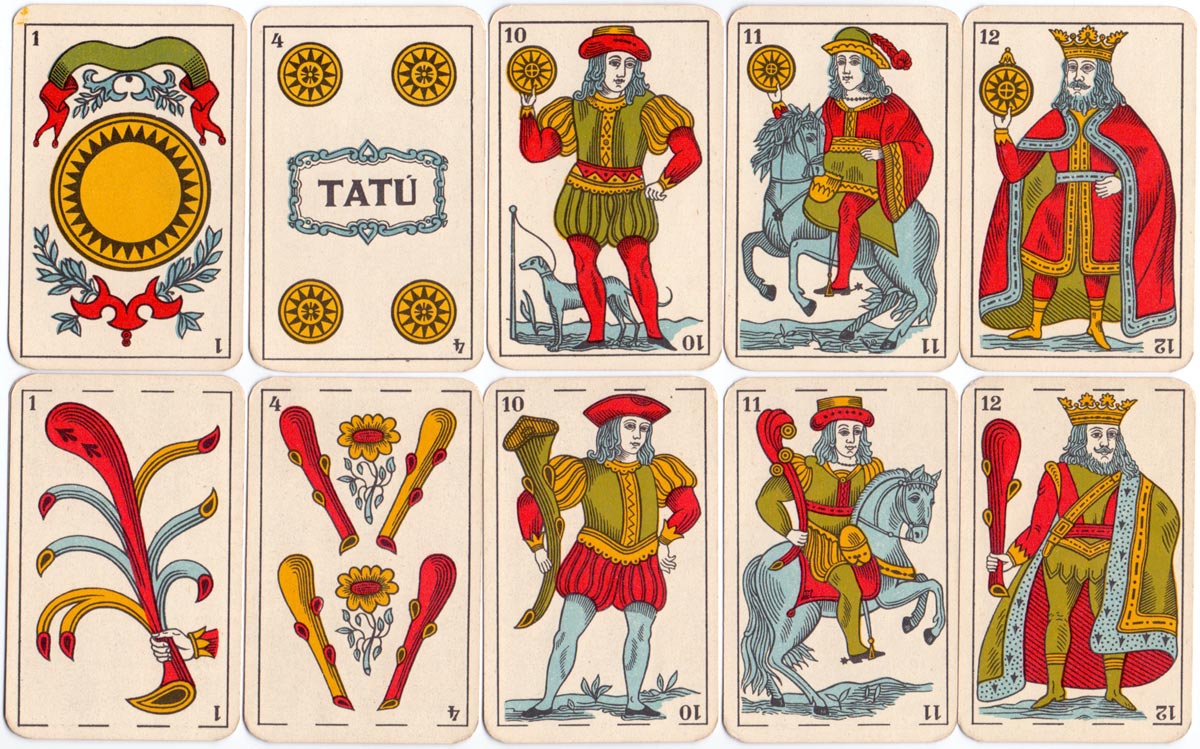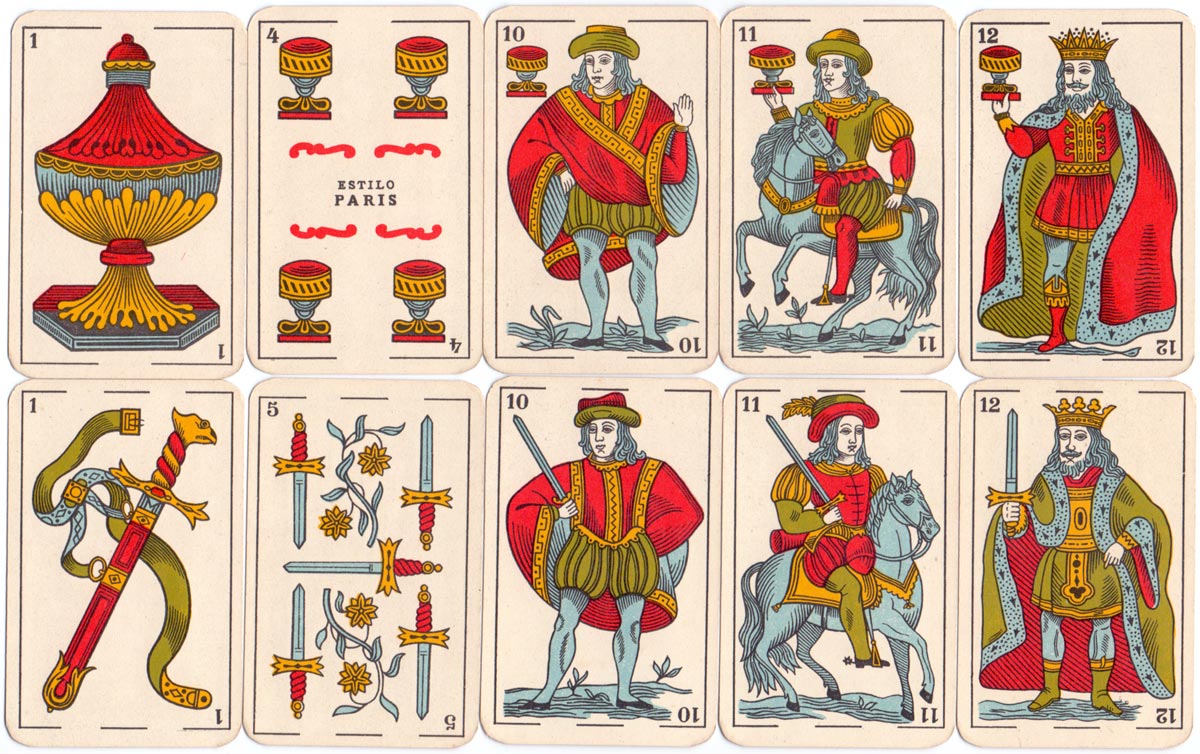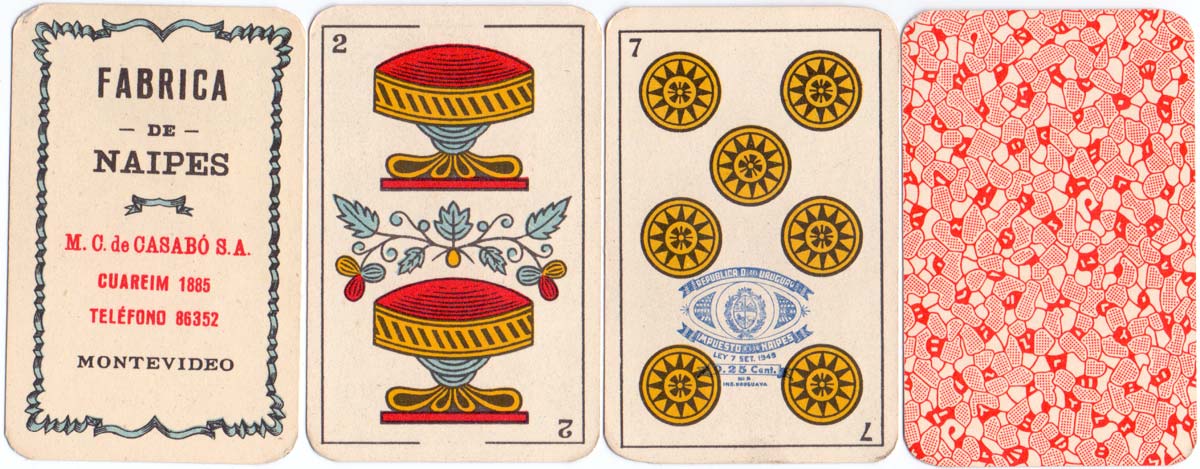Naipes Tatú
Naipes Tatú, M.C. de Casabó S.A., Montevideo, c.1956
Naipes Tatú, M.C. de Casabó S.A., Montevideo, c.1956
Naipes Tatú - 'Parisian' Spanish pattern following designs made in France for export to South America during the 19th century. The sea monster has been omitted from the four of coins but in other respects the designs are consistent with earlier examples. Rounded and gilded corners, manufactured by Fabrica de Naipes M. C. de Casabó S.A., Cuareim 1885, Montevideo, Uruguay, c.1956
Casabó also produced Naipes Conga, Naipes Elefante, Naipes Bambú, Naipes King, Naipes American, The Monkey and Naipes Jaque►
In 1992 the company name became simply Casabó S.A. Market pressures during the 1990s have led to Naipes Tatú being printed by Naipes Comas (Spain), since 2001 by Justo Rodero (Argentina) and since 2007 by Joker S.A. (Argentina).




Above: Naipes Tatú, M.C. de Casabó S.A.. Montevideo, c.1956. 48 cards + extra card in box. (Click tax stamp to zoom).
REFERENCES
Silvera Antúnez, Marcos: Historia de los Naipes en el Uruguay 1724-2015, Ediciónes el Galeón, Montevideo, 2015

By Simon Wintle
Member since February 01, 1996
I am the founder of The World of Playing Cards (est. 1996), a website dedicated to the history, artistry and cultural significance of playing cards and tarot. Over the years I have researched various areas of the subject, acquired and traded collections and contributed as a committee member of the IPCS and graphics editor of The Playing-Card journal. Having lived in Chile, England, Wales, and now Spain, these experiences have shaped my work and passion for playing cards. Amongst my achievements is producing a limited-edition replica of a 17th-century English pack using woodblocks and stencils—a labour of love. Today, the World of Playing Cards is a global collaborative project, with my son Adam serving as the technical driving force behind its development. His innovative efforts have helped shape the site into the thriving hub it is today. You are warmly invited to become a contributor and share your enthusiasm.
Related Articles

Parisian Spanish pattern by Fossorier, Amar et Cie
‘Parisian’ Spanish pattern published by Fossorier, Amar et Cie (Paris), c.1902.

Parisian style Spanish deck by Grimaud
Parisian style Spanish deck by Grimaud for export to Uruguay.

Naipes ‘La Criolla’ by Anabella Corsi
Inspired by an archaic Spanish pattern formerly used in Spain during the 16th and 17th centuries.

Naipes ‘Charabon’
Naipes ‘Charabon’ - depicting the Gaucho as a national hero, Montevideo, 1983.

Naipes Artiguistas, 1816
Naipes Artiguistas published in Concepción del Uruguay, Entre Rios province (Argentina) in 1816, by ...

Playing Cards designed by Alvaros
Playing Cards designed by Alvaros, published by Eduardo Carrión, Montevideo, 2000

Club Nacional de Football, Uruguay
100th anniversary of the Club Nacional de Football, Uruguay, 1999.

Canasta
Canasta is a card game of the Rummy family which originated in Uruguay probably about 1947.

9: Standard English Cards From Latin America: Mexico, Peru, Uruguay and Venezuela
A continuation of the survey of designs used in Central and South America.

Copa de Oro 1980
Naipes “Copa de Oro 1980” manufactured by Compañía General de Fósforos Montevideana, 1980.

Naipes Victoria
Victoria playing cards manufactured in Uruguay by Compañía General de Fósforos Montevideana, c.1955....

Supermercados CHIP
Supermercados CHIP playing cards manufactured in Uruguay by Compañía General de Fósforos Montevidean...

Cía Gral de Fósforos
Compañía General de Fósforos Montevideana, founded in 1893.

Naipes Victoria Gaucho
Naipes Victoria Spanish-suited, gaucho-themed pack celebrating the culture and traditions of the gau...

Naipes ‘Baccarat’
An example of the typical version of the Spanish Catalan pattern which is widely used in South Ameri...

Las Cartas de Sara
Las Cartas de Sara (Yerba Mate) based on an idea by Diego Silva Pintos and illustrated by Hogue. Pro...
Most Popular
Our top articles from the past 28 days

